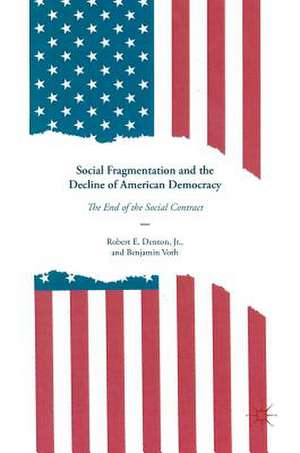Social Fragmentation and the Decline of American Democracy: The End of the Social Contract
Autor Robert E. Denton, Jr., Benjamin Vothen Limba Engleză Hardback – 16 dec 2016
| Toate formatele și edițiile | Preț | Express |
|---|---|---|
| Paperback (1) | 521.60 lei 6-8 săpt. | |
| Springer International Publishing – 27 mar 2017 | 521.60 lei 6-8 săpt. | |
| Hardback (1) | 640.88 lei 6-8 săpt. | |
| Springer International Publishing – 16 dec 2016 | 640.88 lei 6-8 săpt. |
Preț: 640.88 lei
Preț vechi: 753.97 lei
-15% Nou
Puncte Express: 961
Preț estimativ în valută:
122.63€ • 128.30$ • 101.87£
122.63€ • 128.30$ • 101.87£
Carte tipărită la comandă
Livrare economică 02-16 aprilie
Preluare comenzi: 021 569.72.76
Specificații
ISBN-13: 9783319439211
ISBN-10: 3319439219
Pagini: 214
Ilustrații: X, 195 p.
Dimensiuni: 148 x 210 x 18 mm
Greutate: 0.43 kg
Ediția:1st ed. 2017
Editura: Springer International Publishing
Colecția Palgrave Macmillan
Locul publicării:Cham, Switzerland
ISBN-10: 3319439219
Pagini: 214
Ilustrații: X, 195 p.
Dimensiuni: 148 x 210 x 18 mm
Greutate: 0.43 kg
Ediția:1st ed. 2017
Editura: Springer International Publishing
Colecția Palgrave Macmillan
Locul publicării:Cham, Switzerland
Cuprins
A Divided and Selfish Nation: A United States of America No More .- Democracy and the “Social Contract:” Prescription for Freedom and Equality .- Generational Change and Social Values .- The Postmodern Culture and Political Implications .- The Epistemological Poisoning of America .- De-mock-racy: Comic Framing as Political Wrecking Ball .- Making Black Lives Matter Today .- What Can We Do? An American Renaissance Predicated on Communicative Idealism .- The Practice of Politics Today and the Greater Tomorrow.
Notă biografică
Robert E. Denton, Jr., holds the W. Thomas Rice Chair in the Pamplin College of Business and is Professor and Head of the Department of Communication at Virginia Tech, USA. Denton is the author, co-author or editor of 25 books on the presidency and political campaigns. His most recent volume is entitled Political Campaign Communication: Principles and Practices, 8th Edition (with Judith Trent and Robert Friendenberg).
Ben Voth is Associate Professor and Director of Debate and Speech programs in the Communication Studies Division of the Meadows School of the Arts at Southern Methodist University, USA. He is a leading national scholar on debate and the power of the human voice. He is the author of The Rhetoric of Genocide: Death as a Text (2014). He is currently an Advisor to the Bush Institute, USA, and the Debate fellow for the Calvin Coolidge Foundation in Vermont, USA. He is an officer in the American Forensics Association and served on theeditorial board of Argumentation and Advocacy.
Textul de pe ultima copertă
This book explores the social and political implications of what the authors identify as the decline of the social contract in America and the rise of a citizenry that has become self-centered, entitled, and independent. For nearly two decades, America has been in a “cultural war” over moral values and social issues, becoming a divided nation geographically, politically, socially, and morally. We are witnessing the decline of American Democracy, the authors argue, resulting from the erosion of the idea of the social contract. Especially since the “baby boomers,” each successive generation has emphasized personal license to the exclusion of service, social integration, and the common good. With the social contact, the larger general will becomes the means of establishing reciprocal rights and duties, privileges, and responsibilities as a basis of the state. The balkanization of America has changed the role of government from one of oversight to one of dependency, where individual freedom and responsibility are sacrificed for group equality. This book examines the conditions of this social fragmentation, and offers ideas of an American Renaissance predicated on communicative idealism.
Caracteristici
Presents a timely and clear-headed view of generational change and social dynamics from two leading rhetoricians Argues for a return to the social contract built on individual freedom and responsibility Offers optimistic solutions to the problems of partisanship and ideological gridlock








